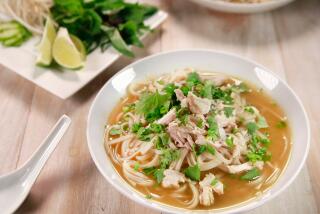Key to Stronger Immunity May Lie in the Cards
- Share via
I have a cold; my daughter has a cold. Her piano teacher (whose name, rather aptly, is Melody) suggests we try zinc--but I’m thinking we should maybe play cards.
Playing cards boosts the immune system! So a UC Berkeley biologist suspects, after a study that enlisted the help of 12 card-playing seniors.
A round of applause for the Orinda, Calif., women’s bridge club: Its members agreed to get stuck with needles before and after lively sets of bridge--and all for the greater good of science.
For years, the study’s author--Marian Cleeves Diamond--had been trying to figure out how the mind can influence the body and boost immunity (there’s evidence that it can).
But why study bridge, for heaven’s sake? Why not prayer, say, or the effects of meditation while listening to soaring, inspirational melodies by Yanni?
Turns out that there’s method in Diamond’s madness: Prior studies of hers have suggested that the mind’s ability to affect the immune system involves a part of the brain that’s active when people sort cards.
And so, with the help of an old college roommate who knew the Orinda gals and a grad student who’d been trained as a phlebotomist, Diamond analyzed samples of the bridge players’ blood before and after a game.
Here’s what she found and presented last week at a giant annual shindig for neuroscientists in New Orleans: A class of key immune cells--CD4 T cells--were elevated in the blood taken after a lively set of bridge compared with the blood taken before a set.
Given the way I play cards, I am glad to read that losers and winners experienced boosts in these immune system cells. But enough of cards. Let’s talk about sex and the immune system.
Sex, we read in the journal Science, could be driving the very evolution of that immune system of ours. So say scientists at the University of Virginia, after comparing the sexual antics and blood composition of 41 types of primates. (And you thought jabbing bridge players with needles was a fun research project.)
Promiscuous monkeys have oodles of germ-fighting white cells in their blood, the scientists found--whereas less wanton monkeys have fewer. Species that pair for life have the fewest of all--together suggesting that sexually profligate behavior might have driven species to evolve more potent immunity to ward off sexually transmitted diseases.
Guess what? We humans, immune-system-wise, are similar to the more monogamous monkeys. (Are family values behind this cold of mine?)
Curing Colds With Curry
Forget the zinc: I think I’ll go for a curry.
Curry’s a good cold remedy, some say. Its spices are filled with antimicrobial chemicals, plus your nose runs and your eyes water and all those nasty bacteria and viruses lodged in your mucous get washed out as a consequence.
But am I wise? Am I prudent? I’ve just learned that curry--just like coffee, chocolate, jogging, sex, bungee-jumping, food in general and, oh, yes, alcohol and sundry controlled substances--might be addictive.
That’s the news from British researchers at Nottingham Trent University, we read in the London Times. Curry, says lead researcher Stephen Gray, “is like sex on a plate.” In Gray’s study, 100 people ages 10 to 80 ate one of three curries (tikka masala, korma or rogan josh) or a plate of fish and chips.
As they ate, scientists found that the curry eaters’ pulse rates and blood pressures rose--a pattern that’s seen with addictive substances.
Even thinking about a curry can elicit these responses, just as with other addictive things. What’s more, the longer one eats curry, the hotter one likes it. In other words, curry eaters develop tolerance--just like drug addicts. (Oh, no!)
*
If you have an idea for a topic, write or e-mail Rosie Mestel at the Los Angeles Times, 202 W. 1st. St., L.A., CA 90012, rosie.mestel@latimes.com.






